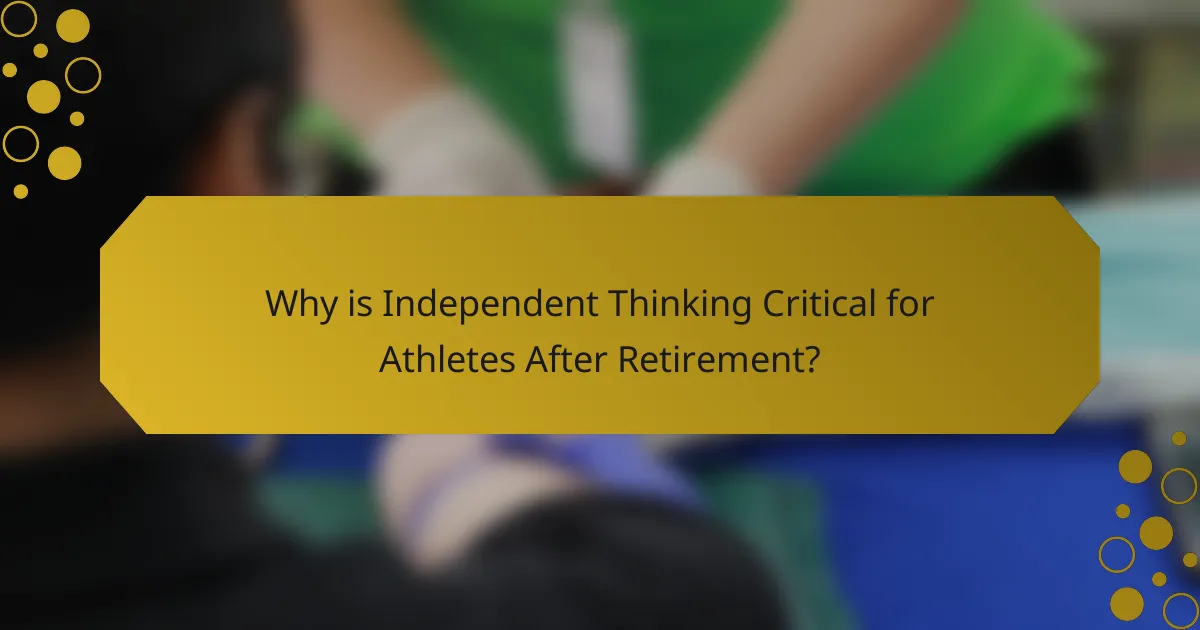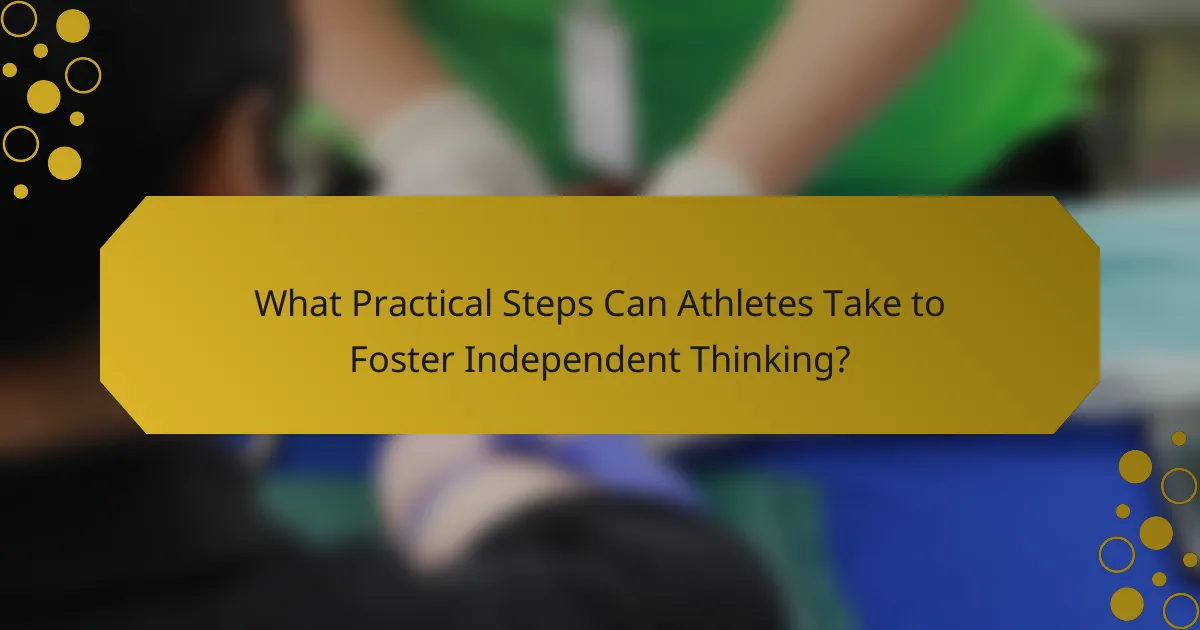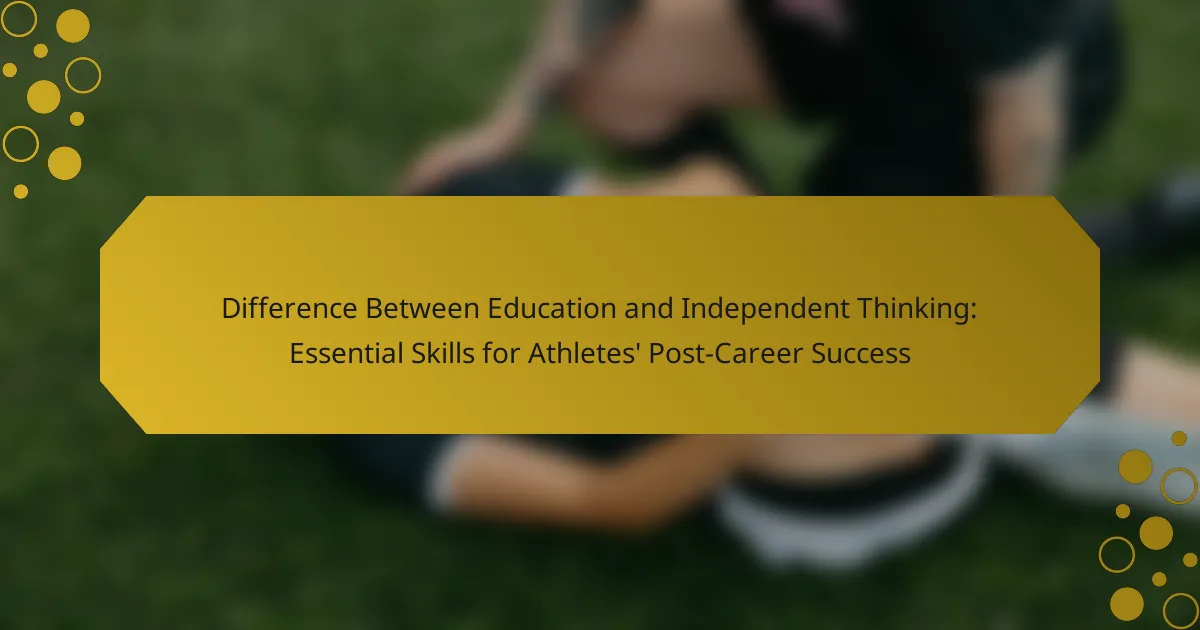Post-career success for athletes hinges on two essential skills: education and independent thinking. Education provides structured knowledge, while independent thinking fosters adaptability and problem-solving. Athletes can navigate new challenges effectively by combining these skills. Developing independent thinking through self-reflection and diverse perspectives enhances decision-making and resilience in their transition to life beyond sports.

What is the Difference Between Education and Independent Thinking?
Education provides structured knowledge, while independent thinking fosters personal decision-making. Athletes benefit from both skills for post-career success. Education equips them with essential information, while independent thinking enhances adaptability and problem-solving. This combination enables athletes to navigate new challenges effectively. Developing these skills can significantly impact their transition into life after sports.
How Do Education and Independent Thinking Contribute to Athlete Success?
Education and independent thinking are crucial for athletes’ post-career success. Education provides knowledge and skills, while independent thinking fosters adaptability and problem-solving. These attributes empower athletes to transition effectively into new roles after their sports careers. Research shows that educated athletes are more likely to pursue diverse career paths, enhancing their long-term success. Independent thinking allows them to navigate challenges and seize opportunities, ensuring sustained achievement beyond sports.
What Are the Essential Skills Required for Post-Career Success?
Athletes require a blend of education and independent thinking for post-career success. Essential skills include financial literacy, networking ability, and adaptability. Financial literacy helps manage earnings effectively, while networking fosters opportunities in various fields. Adaptability ensures athletes can transition into new roles seamlessly. Independent thinking enhances decision-making, allowing athletes to navigate challenges confidently. Combining these skills equips athletes for a successful post-career journey.
Which Skills Are Universally Beneficial for Athletes?
Critical skills for athletes post-career include education and independent thinking. These skills enable adaptability in diverse environments and enhance decision-making abilities. Education provides foundational knowledge, while independent thinking fosters innovation and problem-solving. Both are essential for navigating life after sports. Developing these skills can lead to successful transitions into various careers, ensuring long-term success.
What Unique Skills Set Successful Athletes Apart?
Successful athletes distinguish themselves through independent thinking and adaptability, crucial for post-career success. Education provides foundational knowledge, but the ability to innovate and solve problems independently enhances opportunities. Unique skills include strategic decision-making, resilience, and effective communication. These attributes enable athletes to navigate challenges beyond sports, fostering successful transitions into new careers.
What Rare Attributes Can Enhance an Athlete’s Transition?
Athletes can enhance their transition by developing rare attributes like adaptability, emotional intelligence, and networking skills. These traits facilitate successful navigation of post-career challenges. Adaptability allows athletes to adjust to new environments, while emotional intelligence aids in understanding and managing relationships. Networking skills create opportunities for collaboration and mentorship, essential for career growth beyond sports.

Why is Independent Thinking Critical for Athletes After Retirement?
Independent thinking is crucial for athletes post-retirement as it fosters adaptability and resilience. Unlike traditional education, which often focuses on rote learning, independent thinking encourages critical analysis and personal decision-making. This skill enables retired athletes to navigate new challenges and opportunities effectively. For instance, many athletes face identity crises after leaving their sport; independent thinking helps them redefine their goals and pursue new passions. Additionally, this mindset can enhance their ability to engage in entrepreneurial ventures or community initiatives, ultimately leading to fulfilling post-career lives.
How Can Education Shape an Athlete’s Future?
Education significantly influences an athlete’s future by equipping them with essential skills for post-career success. It fosters critical thinking, problem-solving abilities, and adaptability, which are vital in various fields beyond sports. Athletes who prioritize education often enjoy broader career opportunities, enhancing their ability to navigate life after competition. Studies indicate that educated athletes are more likely to pursue diverse roles in business, coaching, or community leadership, demonstrating the unique attribute of education in shaping long-term success.
What Role Does Mental Health Play in Post-Career Planning?
Mental health significantly influences post-career planning for athletes. It affects decision-making, adaptability, and emotional resilience. Athletes often face identity loss after retirement, making mental health support essential for navigating transitions. Research indicates that mental well-being correlates with successful adaptation to new careers, emphasizing the need for tailored mental health resources. Athletes should prioritize mental health to enhance their post-career success and overall life satisfaction.
How Can Athletes Maintain Mental Wellbeing After Their Careers?
Athletes can maintain mental wellbeing after their careers by developing education and independent thinking skills. These skills empower them to adapt to life beyond sports.
Education provides essential knowledge that can lead to career opportunities. Independent thinking fosters problem-solving abilities, enabling athletes to navigate challenges effectively. A study indicated that 70% of retired athletes feel unprepared for post-career life, highlighting the need for these skills.
Moreover, engaging in lifelong learning can enhance self-esteem and social connections. Athletes should seek resources like mentorship programs and workshops that focus on personal development. These initiatives equip them with the tools to thrive in new environments.
Incorporating mindfulness practices can also support mental wellbeing. Techniques such as meditation and journaling help athletes process their experiences and emotions. By focusing on these strategies, athletes can build resilience and maintain a positive outlook after their sports careers.
What Are Common Mental Health Challenges Faced by Retired Athletes?
Retired athletes often face mental health challenges such as depression, anxiety, and identity crises. These issues stem from the transition away from competitive sports and the loss of structured routines.
Research indicates that around 30% of retired athletes experience significant mental health issues, often linked to feelings of isolation and loss of purpose. The unique attribute here is the sudden shift in lifestyle, which can exacerbate these challenges.
Additionally, many athletes struggle with self-esteem and coping strategies post-career, making it essential to foster independent thinking and adaptability. These skills are vital for navigating life after sports, helping athletes redefine their identities and find new passions.
Addressing these mental health challenges requires awareness and support systems tailored to the unique experiences of retired athletes.

What Practical Steps Can Athletes Take to Foster Independent Thinking?
Athletes can foster independent thinking by engaging in self-reflection, seeking diverse perspectives, and developing problem-solving skills. These practical steps enhance decision-making and adaptability post-career.
1. Practice self-reflection through journaling or meditation to assess experiences and decisions.
2. Engage with mentors outside of sports to gain different viewpoints.
3. Participate in workshops focused on critical thinking and creativity.
4. Set personal challenges that require strategic planning and execution.
5. Collaborate with peers on projects unrelated to athletics to enhance teamwork and communication skills.
How Can Athletes Develop a Growth Mindset?
Athletes can develop a growth mindset by embracing challenges, learning from feedback, and persisting through setbacks. This mindset fosters adaptability, essential for post-career success. Engaging in continuous education and independent thinking enhances decision-making skills, crucial for navigating life after sports. Athletes should practice self-reflection to identify strengths and areas for improvement, reinforcing a commitment to lifelong learning.
What Resources Are Available for Post-Career Planning?
Athletes can access various resources for post-career planning, including educational programs, mentorship opportunities, and financial planning services. These resources help develop independent thinking, enhancing decision-making skills crucial for success. Educational programs often focus on life skills and career transition strategies, while mentorship connects athletes with experienced professionals. Financial planning services guide athletes in managing their earnings effectively, ensuring long-term stability.

What Mistakes Should Athletes Avoid in Their Post-Career Transition?
Athletes should avoid common mistakes in their post-career transition to ensure success. Key errors include neglecting education, underestimating the value of independent thinking, and failing to network effectively.
Education provides foundational knowledge, while independent thinking fosters adaptability and problem-solving. Athletes must prioritize continuous learning, as many skills become outdated quickly. Networking is essential; it opens doors to opportunities beyond sports.
Additionally, ignoring mental health can hinder transition. Athletes should seek support and develop coping strategies. Embracing these aspects enhances resilience and prepares athletes for diverse career paths.
What Best Practices Can Enhance Post-Career Success?
Education and independent thinking are crucial for athletes’ post-career success. Athletes should focus on lifelong learning, networking, and developing critical thinking skills. Education provides foundational knowledge, while independent thinking fosters adaptability in various fields. Emphasizing both aspects enhances decision-making and problem-solving abilities, leading to successful transitions. Athletes who engage in continuous education and practice independent thought can effectively navigate career changes and pursue diverse opportunities.
